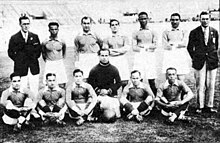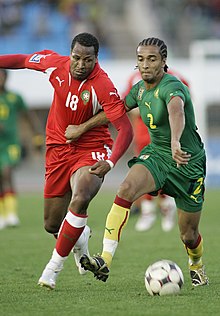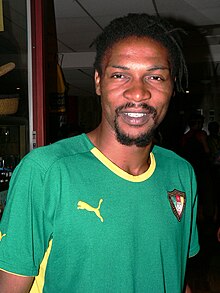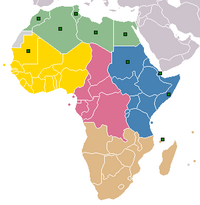Portal:Football in Africa
Introduction
Football is the most popular sport in Africa, alongside basketball. Indeed, football is probably the most popular sport in every African country, although rugby and cricket are also very popular in South Africa. The first football stadium to be built in Africa was the Alexandria Stadium in 1929.
The English Premier League is the most popular sports league in Africa. The most popular clubs in Africa are Arsenal, Chelsea and Manchester United. (Full article...)
This section may be unbalanced toward certain viewpoints. (October 2022) |

Selected article -
Founded on 5 January 1911 as Qasr El Nile Club, the club has traditionally worn a white home kit since its inception. The club's name was changed two years later to Cairo International Sports Club (Zamalek), colloquially El Qāhirah El Mokhtalat Club or El Mokhtalat Club. In 1941, the club was granted the honorific title after Farouk I and became officially known as Farouk El Awal Club (transl. Farouk I Club), however, since the 1910s, Zamalek was the club's unofficial name and it became official after the 1952 Egyptian Revolution.
Domestically, Zamalek established itself as one of the two major forces in Egyptian football during the 1920s, as it is the first Egyptian team to ever win a title. Zamalek was the first Egyptian team to win Sultan Hussein Cup in 1921 and 1922, and the first team to win the Egypt Cup in 1922; and the first team to win the Cairo League in 1922–23. In domestic football, the club has won 65 trophies; 14 Egyptian Premier League titles, 28 Egypt Cup titles, 4 Egyptian Super Cup titles, 14 Cairo League titles, 2 Sultan Hussein Cup titles, and a record of one title for each of the October League Cup, Egyptian Friendship Cup and Egyptian Confederation Cup. It is one of two clubs that have played in every season of the Egyptian Premier League, and one of seven that have never been relegated to the Egyptian Second Division.
Selected biography -
Rigobert Song Bahanag (born 1 July 1976) is a Cameroonian former professional footballer who was most recently the manager of the Cameroon national team.
Known for his defensive skills, Song usually played as a centre-back, but could also operate at right-back. Internationally, he played at a record eight Africa Cup of Nations tournaments and served as captain in five (the ones he was not captain for were South Africa 1996, Burkina Faso 1998 and Angola 2010), a record, and holds the record of most consecutive games played in the tournament with 35 first team games. He has won two CAF Africa Cup of Nations titles in 2000 and 2002. In 2009, Song was dropped as Cameroon skipper by new coach Paul Le Guen, who eventually appointed Samuel Eto'o as the new captain, which later caused concerns, as Song had never been on the bench in more than eleven years for Cameroon. With 137 appearances, Song also holds the record of the most capped player in the history of the Cameroon national team and has played in four World Cups, in 1994, 1998, 2002 and 2010.
Song started his professional career with Metz and helped the club to win the Coupe de la Ligue in 1996. After appearing at the 1998 World Cup, he joined Salernitana, newly promoted to the top-flight Italian Serie A. In January 1999, he left Italy to start successive stints with Liverpool, West Ham United and 1. FC Köln, but after failing to hold down a first-team place, he returned to France to play for Lens. He stayed there until 2004, before moving on to Turkey, where he spent four years with Galatasaray, winning two Süper Lig titles and the Turkish Cup. Song then signed a contract with Trabzonspor in 2008, where he won another Turkish Cup and stayed until 2010.
Selected image -
Subcategories
Related portals
More sports portals
WikiProjects
Related task forces and sub-projects
African football task force
WikiProject Africa • WikiProject Football
WikiProject Football task forces and sub-projects
 | |
| Wikipedia ads | file info – #250 |
Topics
Open tasks

- Expand stubs: Competitions in Africa • Organizations
- Expand club articles of teams from Africa.
- Expand biographies of Africans involved in football.
- Create: Requested articles • Most wanted football articles • Requested general football articles
- Add: Infoboxes • Images (General requests, Requested images of people)
- Review: articles currently under review
- Assess: Assessment requests • Assess an article
- Revert vandalism on this portal and on African football articles
- Assist in maintaining this portal and keeping its selected content up to date.
- WikiNews: Create and submit news stories about African football for Wikipedia's sister project WikiNews.
Associated Wikimedia
The following Wikimedia Foundation sister projects provide more on this subject:
-
Commons
Free media repository -
Wikibooks
Free textbooks and manuals -
Wikidata
Free knowledge base -
Wikinews
Free-content news -
Wikiquote
Collection of quotations -
Wikisource
Free-content library -
Wikiversity
Free learning tools -
Wiktionary
Dictionary and thesaurus
More portals
Sources

- ^ "The History Of Soccer In Africa". NPR.org. 2010-06-09. Retrieved 2016-03-31.
- ^ a b c Alegi, Peter (2010). African Soccerscapes. Ohio University Press. pp. 1–2. ISBN 9780896802780.
- ^ Frimpong, Enoch Darfah. "Ghana news: A world of superstition, frustration and disillusionment - Graphic Online". Retrieved 23 September 2017.
- ^ Lacey, Marc (8 August 2002). "Kangemi Journal; For Spellbinding Soccer, the Juju Man's on the Ball". The New York Times. NY Times. Retrieved 2016-03-31.
- ^ "World Cup Witchcraft: Africa Teams Turn to Magic for Aid". National Geographic. Archived from the original on July 10, 2006. Retrieved 2016-03-31.
- ^ Andy Mitten (September 2010). The Rough Guide to Cult Football. Rough Guides UK. ISBN 9781405387965. Retrieved 2016-04-02.
- ^ "African Nations Cup overshadowed by hocus pocus | Football". The Guardian. Retrieved 2016-04-09.
- ^ Kuper, Simon (2006). Soccer Against the Enemy: How the World's Most Popular Sport Starts and Stops Wars, Fuels Revolutions, and Keeps Dictators in Power. Nation Books. p. 123. ISBN 978-1-56025-878-0.



























